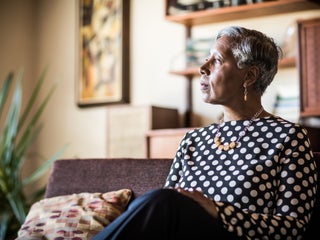Summary
When we think about wellness, physical and mental health are the first things that come to mind. In truth, wellness has many dimensions to it, and reaching it requires forming habits that will lead you to a fulfilling lifestyle. An important part of this is financial wellness. It’s hard to…
The content on this page is accurate as of the posting date; however, some of our partner offers may have expired. Please review our list of best credit cards, or use our CardMatch™ tool to find cards matched to your needs.
When we think about wellness, physical and mental health are the first things that come to mind. In truth, wellness has many dimensions to it, and reaching it requires forming habits that will lead you to a fulfilling lifestyle.
An important part of this is financial wellness. It’s hard to imagine living a fulfilling lifestyle when financial struggles are constantly on your mind – which might be especially true now during the pandemic.
If financial wellness is a milestone you’re yet to hit on your journey to the life you want, you’re in the right place. Read on to learn about various aspects of financial wellness and what you can do to reach it.
How the pandemic has affected financial wellness for women in the U.S.
As with many financial catastrophes, the coronavirus pandemic has hit women harder. Millions of people have lost their jobs in the pandemic but it’s been a trend that women account for most job losses. For instance, between February 2020 and January 2021, women lost more than 5.4 million jobs, accounting for 55% of all job losses combined since the crisis began. In December 2020, women accounted for all job losses.
These numbers aren’t surprising. Women, for example, are the ones who typically step away from work during a caregiving crisis, which also has been an issue during the pandemic. One out of four women who lost their job during the pandemic said it was because of a lack of childcare – twice the rate among men.
Top that with the problem of pay gap. You’ve probably heard the numbers: Women, on average, make around 78 cents for every dollar earned by a man. And women of color earn less than white women: Black women make 61 cents to every dollar and Hispanic women make 53 cents on the dollar.
Such financial hardships, temporary or not, affect women’s financial wellness. And how you feel financially touches all other aspects of your life: your relationships, your diet, definitely your mental health. That’s why it’s so important to take care of your financial health, especially at times like this.
How to improve your financial wellness
It can help to think that taking care of your finances is a form of self-care, which consists of four aspects: living within your means, being prepared for financial emergencies, being able to plan for the future and continuing to educate yourself.
Think of these four elements as four areas of your financial health.
Living within your means
Keeping your spending within your means is all about developing healthy habits, which allows you to feel well overall. It includes:
- Budgeting – Knowing how your money comes and where it goes keeps you in control of your financial life. Categorize your expenses and plan in advance how much you’re going to spend within the categories. Stick to your plans to gain full control over your spending.
- Avoiding overspending and impulse buying – Shopping may seem like a stress reliever, but it will only add to your stress if you spend outside your budget or even get into debt.
- Paying down your debt as much as you can – Speaking of debt, you should work on eliminating it, especially if it’s credit card debt. Avoid carrying a balance on your credit cards and work on paying down your other debts, such as car loans or personal loans. The higher interest on your debt, the faster you want to get rid of it.
- Regularly adding to your savings – The best preventive measure against debt is savings. Create a fund for traveling, another one for future large purchases and, most importantly, one for emergencies.
All of this will help you be in control of your financial life, eliminating the feeling as though you’re living paycheck to paycheck. It will allow you to feel financially healthy.
Build your emergency savings
Speaking of financial emergencies, it’s crucial to be prepared for unexpected expenses.
Your emergency fund is your financial immune system. Having these funds protects your financial health against unexpected events. For instance, your car breaks down, or your water heater stops working. These things happen, and you can rarely predict them. Or, what if you’ve lost your job, as has happened to many women in these difficult economic times?
Your emergency fund, your immune system, will protect you from the financial pain and consequences of all such things that just happen because you’ll be prepared to handle them.
Many experts recommended having between three and six months’ worth of basic expenses in your emergency fund. If that amount sounds overwhelming, start small. Try to get your emergency fund, say, up to $1,000. Even having $500 saved up can make a huge difference when an emergency strikes.
Planning for the future
Planning for your future is making sure you’ll stay financially healthy and thrive by building wealth. It’s setting goals, however, big or small, growing your retirement funds or investing when you feel you’re ready for it.
This is good for your mental health, too: You know where you’re going and have an idea how you’ll get there. It’s also great medicine for financial anxiety since it helps you feel prepared and on top of your finances.
Even if you can’t afford to start putting money in your retirement plan and investments or even any kind of savings apart from your emergency fund, you can still work toward the future you want. Self-educate on 401k, IRA and other retirement plans and read up on investment basics – you’ll be grateful to yourself you have this knowledge once you’re prepared to use it.
Continuing self-education
Educating yourself on financial topics will empower you to make financial decisions in confidence.
There are countless aspects to personal finance, from buying a car to managing student debt to choosing a credit card or a savings account. Moreover, every financial industry is ever-evolving, meaning what is true today might not be true in a year. This means that learning never stops.
Another important part of self-education is building a community of allies to learn with — and from — to empower each other.
Women’s financial lives are different from those of many men, as we face unique challenges and fight our own unique fights when overcoming those challenges.
Connect with other women on the path to financial wellness. Supporting each other, sharing experiences and perspectives and having open conversations about money will help you grow.
Bottom line
Financial wellness requires creating a structure that will help you feel that you control your money, not the other way around. It’s not a linear journey and there’s no simple solution.
Rather, it’s about modifying your behaviors and creating habits with a goal to reach financial comfort. To make this comfort a norm, you need to continually work on every aspect of your financial life – and never stop learning.
Editorial Disclaimer
The editorial content on this page is based solely on the objective assessment of our writers and is not driven by advertising dollars. It has not been provided or commissioned by the credit card issuers. However, we may receive compensation when you click on links to products from our partners.



